Google introduced Coral development board and USB accelerator with Google Edge TPU last year. The development board was comprised of a baseboard and Coral system-on-module with an NXP i.MX 8M quad-core Arm Cortex-A53 processor and the Edge TPU.
Since then ASUS announced Tinker Edge T and CR1S-CM-A SBC based on the Coral module, and yesterday, I noticed Seeed Studio started selling mPCIe and M.2 AI accelerator card with Google Edge TPU, while today, Google announced upcoming Coral products for 2020.
Coral Mini PCIe and M.2 Accelerators
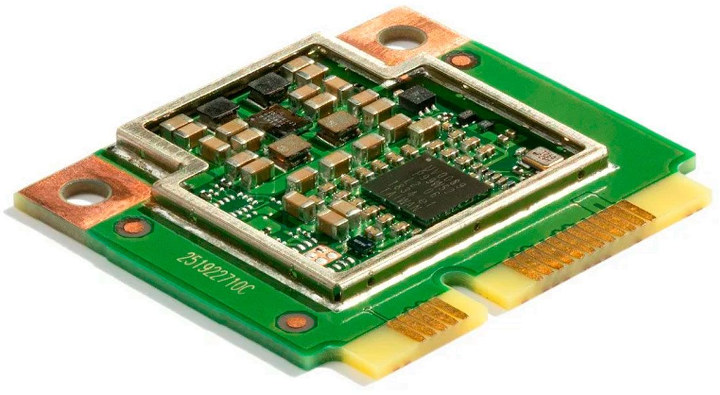 Coral Mini PCIe card specifications:
Coral Mini PCIe card specifications:
- Half-mini PCIe card with PCIe Gen2 x1
- Supply voltage – 3.3VDC +/- 10 %
- Dimensions – 30.00 x 26.80 x 2.55 mm
- Weight – 3.6 g
- Temperature Range – Storage: -40 ~ 85°C; operating: -20 ~ 70°C
- Relative humidity – 0 ~ 100% (non-condensing)
- Op-shock – 100 G, 11ms (persistent); 1000 G, 0.5 ms (stress); 1000 G, 1.0 ms (stress)
- Op-vibe (random) – 0.5 Grms, 5 – 500 Hz (persistent); 3 Grms, 5 – 800 Hz (stress)
- Op-vibe (sinusoidal) – 0.5 Grms, 5 – 500 Hz (persistent); 3 Grms, 5 – 800 Hz (stress)
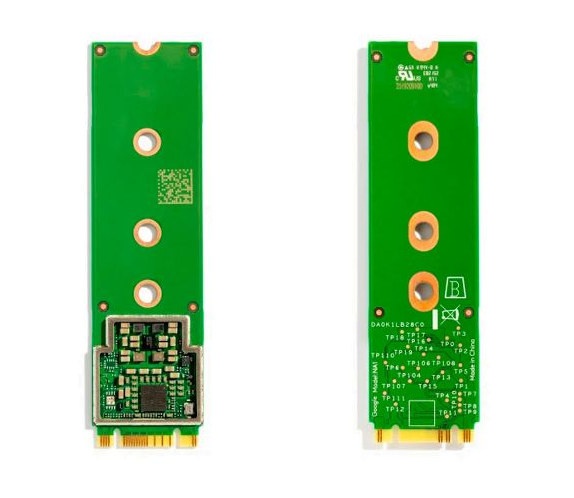
Coral M.2 Accelerators specifications:
- M.2 Card with PCIe Gen2 x1
- Supply Voltage – 3.3V +/- 10 %
- Dimensions & Weight
- B+M key – 22.00 x 80.00 x 2.35 mm | 5.8 grams
- A+E key – 22.00 x 30.00 x 2.35 mm | 3.1 grams
- Temperature Range – Storage – -40 ~ 85°C; operating: -20 ~ 70°C
- Relative Humidity -0 ~ 100% (non-condensing)
- Op-shock – 100 G, 11ms (persistent); 1000 G, 0.5 ms (stress);1000 G, 1.0 ms (stress)
- Op-vibe (random) – 0.5 Grms, 5 – 500 Hz (persistent);3 Grms, 5 – 800 Hz (stress)
- Op-vibe (sinusoidal) – 0.5 Grms, 5 – 500 Hz (persistent); 3 Grms, 5 – 800 Hz (stress)
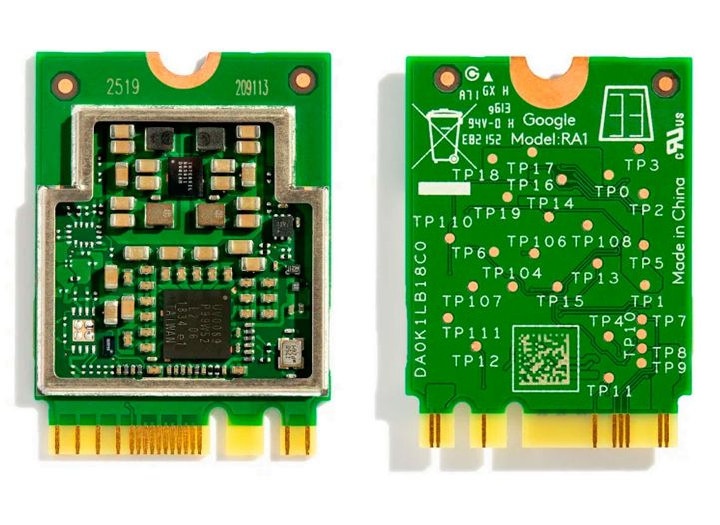
Those cards allow you to add Google Edge TPU to accelerate AI workloads (up to 4 TOPS, 0.5 Watt/TOPS) to any x86 or Arm mini PC, SBC, or gateway with either mPCIe or M.2 sockets.
All three Edge TPU cards are up for pre-order for $34.99 on Seeed Studio with delivery scheduled for mid-February 2020, and I’ve noticed the company is also taking orders for the original Coral Edge SoM for $114.99.
Coral Products for 2020
Coral Accelerator Module
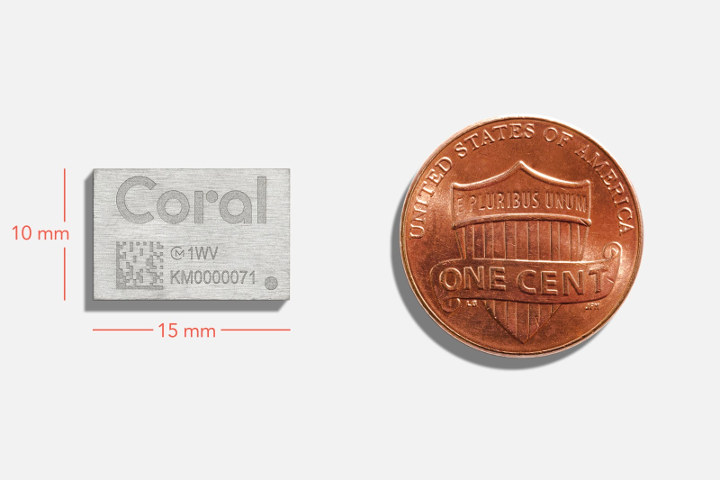
The first new Coral product coming later this year is a tiny 15×10 mm Coral Accelerator module (120-pin LGA) that exposes both PCIe and USB interfaces for easy integration with various processors and PCB designs. Google partnered with Murata to produce the module which will be demonstrated at the company’s booth at CES 2020. The Coral Accelerator Module will launch in H1 2020. Visit the product page for more details.
Coral Dev Board Mini
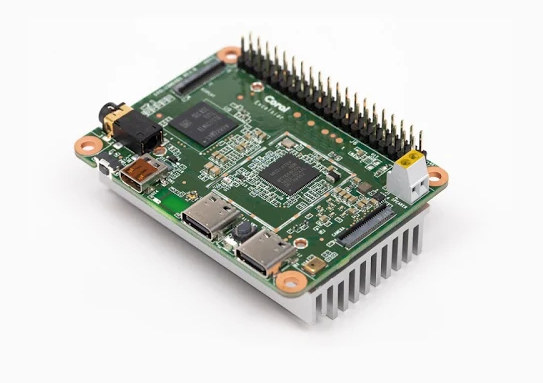
The first board to leverage Coral Accelerator Module will be Coral Dev Board Mini with the following specifications:
- SoC – MediaTek 8167s quad-core Arm Cortex-A35 processor with Imagination PowerVR GE8300 GPU
- ML accelerator – Google Edge TPU coprocessor (in Coral Accelerator Module)
- System Memory – 2 GB DDR3L RAM
- Storage – 8GB eMMC flash memory
- Connectivity – Wi-Fi 5 802.11a/b/g/n/ac, Bluetooth 5.0
- Video Output
- micro HDMI 1.4 port
- 39-pin FFC connector for 4-lane MIPI-DSI display
- Video – 720P video encoding/decoding
- Audio – 3.5mm audio jack; digital PDM microphone; 2.54mm 2-pin speaker terminal;
- Camera – 24-pin FFC connector for 4-lane MIPI-CSI2 camera
- USB – 2x USB 2.0 Type-C ports
- Expansion – 40-pin GPIO header
The board is meant to be a lower-cost version of the original Coral Dev Board with a smaller form factor, and a cheaper MediaTek processor replacing the NXP i.MX 8M SoC. The board will also be launch in H1 2020, hopefully for under $100 (The Coral Dev Board currently sells for $150 and up). You may find further information on the product page.
Coral SoM Gets up to 4GB RAM
The first Coral system-on-module ships with 1GB LPDDR4 RAM, Google will soon be offering a version with 2GB and 4GB LPDDR4 RAM which should help with some applications and people trying to build packages directly on the board.
There aren’t any changes to the Edge TPU in any of the new products above, and it still delivers 4 TOPS, supports TensorFlow Lite as well as AutoML Vision Edge to build and deploy fast, high-accuracy custom image classification models.

Jean-Luc started CNX Software in 2010 as a part-time endeavor, before quitting his job as a software engineering manager, and starting to write daily news, and reviews full time later in 2011.
Support CNX Software! Donate via cryptocurrencies, become a Patron on Patreon, or purchase goods on Amazon or Aliexpress


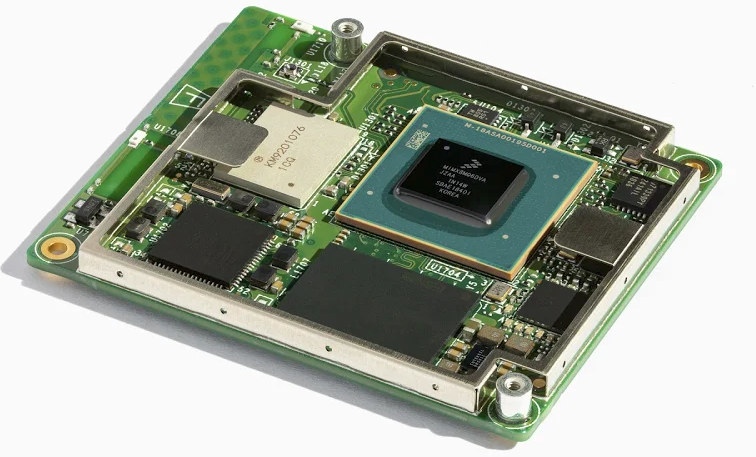
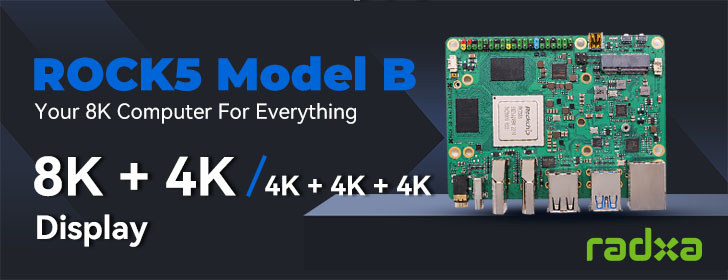

Does anyone know of a sub $100 SBC that will work with the plugin M.2 or Mini PCIe accelerators?
I don’t know, but you may want to check some of the low-cost RK3399 boards with mPCIe or M.2 sockets:
Rock Pi 4 – >https://www.cnx-software.com/2018/11/08/rock-pi-4-raspberry-pi-rk3399-board/
Orange Pi 4 + mPCIe adapter
https://www.cnx-software.com/2019/11/29/buy-orange-pi-4-4b-single-board-computer/
https://www.cnx-software.com/2020/01/06/orange-pi-4-4b-pcie-expansion-board-mpcie-socket-sim-card-slot/
You’d have to double-check the specs/schematics to make sure that works though.